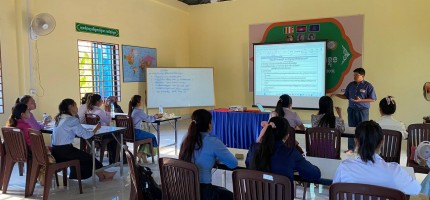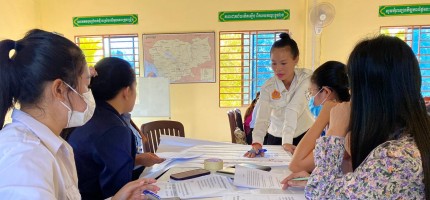News & Events
An orientation on Local life skill and girl counselling program
Date : 2024-05-09


Consortium for Sustainable Alternatives and Voice for Equitable Development (CO-SAVED) hosted an orientation on Local life skills and a girl counseling program for teachers in charge at Koh Kong and Sihanoukville province with 36 participants (19 females) in early May 2024.
The orientation focused on key points as follows:
- Follow up local life skill program teaching schedules and activities for teaching and learning through 6 steps.
- Assessment of student learning results about local life skills.
- Address kind of vulnerable girls facing dropping out of school and difficult situations to access education.
- Support girls to get well-being and enhance collaboration with stakeholders.
- Encourage girls to get social services that support them to attain abundant life learning.
“Gender promotion must start at the grassroots level, especially all stakeholders involved actively, and urge them to join effectively. Moreover, encouraging girls to receive health services is an indispensable contribution. I appreciate the Girl Counseling program; it is crucial because it helps vulnerable girls to change their behavior and reduces drop out of school rate,” said by Mrs. Oeurn Channeang, a Gril counselor from Steng Samrong lower secondary school.
In the 2023-2024 academic year, the CO-SAVED project is being implemented in four target provinces including Kampot, Kep, Sihanoukville, and Koh Kong to carry on partnership approaches with all parties and encourage development partners to engage in helping children access education.
The CO-SAVED project is a 4-year action implemented from 2021 to 2024, with financial support from the European Union, the Qatar Foundation’s Educate a Child initiative (EAC), and Aide et Action (AeA) to transform coastal fisherfolk communities to become more resilient through sustainable local economic development which contributes to reducing poverty and inequality.
Link to other Website
International NGOs
Local NGOs
Media
Ministries of Royal Government of Cambodia
- Ministry of Education, Youth and Sport (MoEYS)
- Ministry of Health (MoH)
- Ministry of Economy and Finance (MoEF)
- Ministry of Interior (MoI)
Other links
117
Preschool(s)
178
Primary Schools
207
High Schools
2
Higher Education Institutions
163,072
Students
4,487
Teachers/Directors
5,362
Stakeholders


